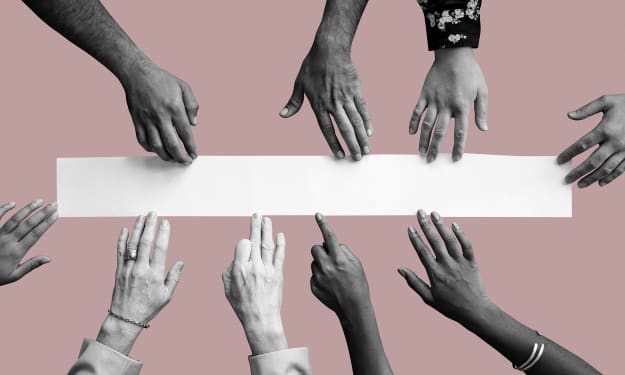TikTok Will Ban
TikTok will give a comeback

About
TikTok is a social media platform where users can create and share short-form videos, typically ranging from 15 seconds to 1 minute. The app allows users to add music, filters, and other special effects to their videos, and also includes features such as duets, where users can collaborate with each other on videos. TikTok has become very popular in recent years, particularly among younger generations, and has been credited with launching viral trends and popularizing new music and dance styles. However, the app has also faced criticism over issues such as data privacy and concerns about the potential for harmful content to spread on the platform.
History
TikTok has a relatively short history, having been launched in its current form in 2017. However, the app has its roots in a Chinese app called Douyin, which was developed by the tech company ByteDance and launched in China in 2016. ByteDance created TikTok as a separate app to target international audiences, and the app was launched in September 2017.
TikTok quickly gained popularity, particularly among younger audiences, and by 2018 it had become one of the most downloaded apps in the world. The app's success was fueled in part by its algorithm, which uses machine learning to suggest content to users based on their viewing habits and engagement with other videos. This algorithm helped to create a personalized experience for each user, making the app highly engaging.
In 2018, TikTok merged with another popular short-form video app called Musical.ly, which had a large user base in the United States and other countries. The merger helped to solidify TikTok's position as a leading social media platform, and the app continued to grow in popularity over the following years.
TikTok has faced some challenges and controversies along the way. In 2019, the app was briefly banned in India over concerns about the spread of inappropriate content. The app has also faced scrutiny in some countries over data privacy concerns, with some governments calling for tighter regulations on the app's operations. However, TikTok has remained a hugely popular platform, with millions of users around the world creating and sharing videos on the app every day.
Earnings in TikTok
TikTok is a hugely popular platform that has become a major player in the world of social media. However, because the app is owned by a private company, it is difficult to know exactly how much money TikTok earns. ByteDance, the parent company of TikTok, is a private company that does not publicly disclose its financial results. However, there have been some estimates of the company's earnings based on various factors.
One source of revenue for TikTok is advertising. The app allows companies to create and display ads to its users, and TikTok reportedly charges premium rates for advertising due to the high engagement and popularity of the platform. In 2020, it was reported that TikTok earned an estimated $1 billion in advertising revenue in the United States alone.
Another potential source of revenue for TikTok is through in-app purchases. While the app itself is free to use, users can purchase virtual coins that can be used to buy gifts for other users, which can in turn be converted into real money. Some users have reported earning significant amounts of money through these virtual gifts, with some estimates suggesting that top creators on TikTok can earn tens of thousands of dollars per month through in-app purchases.
Overall, while it is difficult to know exactly how much money TikTok earns, the app's popularity and engagement make it a potentially lucrative platform for advertising and other revenue streams.
TikTok Is Harmful?
There are some concerns that TikTok can be a harmful application, particularly when it comes to issues such as user privacy and the potential for harmful content to spread on the platform. Here are some of the main concerns that have been raised about TikTok:
1. Privacy concerns: There have been concerns that TikTok collects user data, including information about their location, browsing history, and device information, and shares this data with its parent company, ByteDance. This has raised concerns about user privacy, particularly given that ByteDance is based in China, which has a different approach to data privacy than other countries.
2. Spread of harmful content: Like many social media platforms, TikTok has faced criticism over the potential for harmful content to spread on the platform, including content that promotes hate speech, misinformation, or harmful behavior. Some users have also reported experiencing cyberbullying or harassment on the platform.
3. Addiction: TikTok, like many other social media apps, can be highly addictive, and some users have reported spending significant amounts of time on the app, to the detriment of other aspects of their lives.
4. Impact on mental health: There is some concern that social media platforms like TikTok can have a negative impact on mental health, particularly among young people. Studies have suggested that excessive social media use can lead to feelings of anxiety, depression, and low self-esteem.
While there are concerns about the potential harms of TikTok, it is worth noting that the app can also be a fun and creative platform that provides entertainment and community to its users. Like any technology, it is important to use TikTok responsibly and to be aware of the potential risks and benefits.
Why Government Ban Tiktok
Governments in some countries have banned TikTok due to concerns about various issues related to the app, such as data privacy, national security, and harmful content. Here are some of the reasons why governments have banned TikTok:
1. Data privacy: Some governments have raised concerns about the collection and use of user data by TikTok, particularly given that the app's parent company, ByteDance, is based in China. Some governments have expressed concerns that user data could be shared with the Chinese government, which could pose a national security risk.
2. Harmful content: Some governments have banned TikTok due to concerns about the spread of harmful content on the platform, including content that promotes hate speech, misinformation, or harmful behavior. Some governments have also expressed concerns about the potential for cyberbullying or harassment on the app.
3. Geopolitical tensions: In some cases, TikTok has been banned as part of broader geopolitical tensions between countries, particularly between China and other countries. For example, India banned TikTok in 2020 amid border tensions with China.
4. Regulation: Some governments have banned TikTok as part of broader efforts to regulate social media and technology companies. For example, the United States government has taken steps to ban TikTok due to concerns about data privacy and national security.
It's worth noting that while TikTok has faced some challenges and controversies, the app remains hugely popular around the world, particularly among younger audiences. Many users enjoy the creative and entertaining content on the platform, and some have argued that banning TikTok could limit freedom of expression and access to information.
Countries That Banned TikTok
Several countries have banned TikTok or taken steps to restrict its use. Here are some of the countries that have banned TikTok or taken action against the app:
1. India: India was one of the first countries to ban TikTok, along with several other Chinese apps, in June 2020. The government cited national security concerns and concerns about the app's content moderation policies.
2. United States: The Trump administration attempted to ban TikTok in the United States, citing concerns about data privacy and national security. However, these efforts were blocked by courts, and the Biden administration has taken a different approach, seeking to address concerns through regulatory action.
3. Pakistan: Pakistan banned TikTok in October 2020, citing concerns about "immoral and indecent" content on the platform.
4. Bangladesh: Bangladesh banned TikTok in June 2021, citing concerns about the spread of pornography and misinformation on the platform.
5. Indonesia: Indonesia briefly banned TikTok in 2018 over concerns about inappropriate content on the platform, but the ban was lifted after TikTok agreed to increase moderation efforts.
6. Iran: Iran blocked access to TikTok in May 2021, citing concerns about the app's content and its impact on culture and morality.
Other countries, including Australia, Japan, and the United Kingdom, have raised concerns about TikTok's data privacy policies and content moderation practices, but have not yet taken steps to ban the app.
Will TikTok Permanently Close?
It is unlikely that TikTok will permanently close in the near future, as the app remains hugely popular around the world and has a large user base. While TikTok has faced some challenges and controversies, including regulatory and legal challenges in some countries, the app has been able to continue operating by making changes to its policies and practices.
In some countries, TikTok has faced temporary bans or restrictions, but these have generally been lifted after the app made changes to address concerns about data privacy, content moderation, or other issues. In other cases, TikTok has been able to continue operating by working with regulators or by creating local versions of the app that comply with local laws and regulations.
While there is always some level of uncertainty around the future of any app or platform, TikTok's continued popularity and its efforts to address concerns about user privacy and harmful content suggest that the app is likely to continue operating for the foreseeable future.





Comments
There are no comments for this story
Be the first to respond and start the conversation.